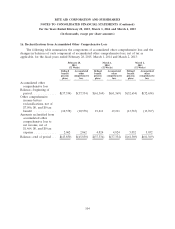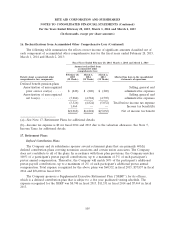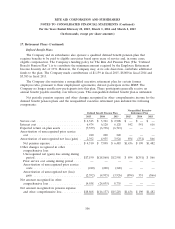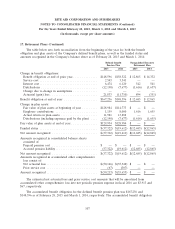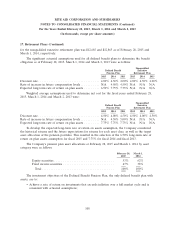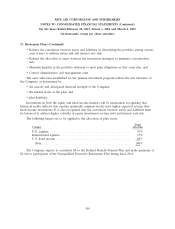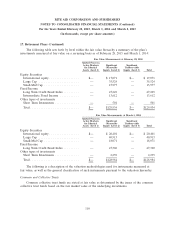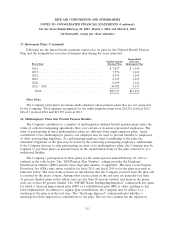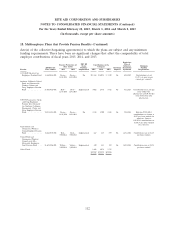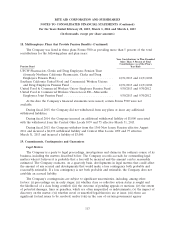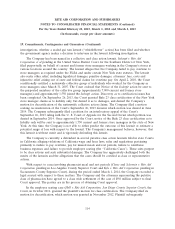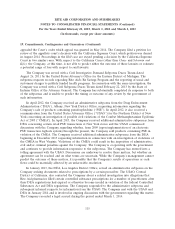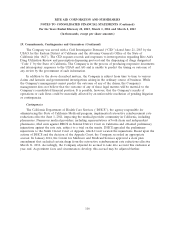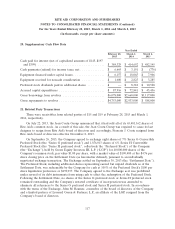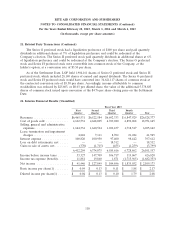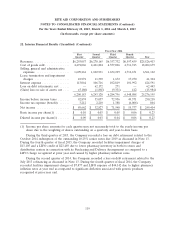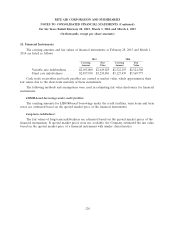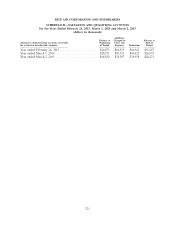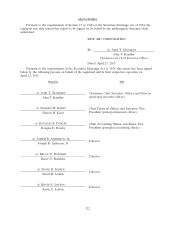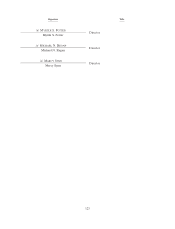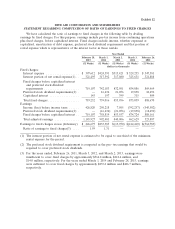Rite Aid 2015 Annual Report Download - page 114
Download and view the complete annual report
Please find page 114 of the 2015 Rite Aid annual report below. You can navigate through the pages in the report by either clicking on the pages listed below, or by using the keyword search tool below to find specific information within the annual report.RITE AID CORPORATION AND SUBSIDIARIES
NOTES TO CONSOLIDATED FINANCIAL STATEMENTS (Continued)
For the Years Ended February 28, 2015, March 1, 2014 and March 2, 2013
(In thousands, except per share amounts)
19. Commitments, Contingencies and Guarantees (Continued)
investigations, whether a sealed qui tam lawsuit (‘‘whistleblower’’ action) has been filed and whether
the government agency makes a decision to intervene in the lawsuit following investigation.
The Company has been named in a collective and class action lawsuit, Indergit v. Rite Aid
Corporation et al pending in the United States District Court for the Southern District of New York,
filed purportedly on behalf of current and former store managers working in the Company’s stores at
various locations around the country. The lawsuit alleges that the Company failed to pay overtime to
store managers as required under the FLSA and under certain New York state statutes. The lawsuit
also seeks other relief, including liquidated damages, punitive damages, attorneys’ fees, costs and
injunctive relief arising out of state and federal claims for overtime pay. On April 2, 2010, the Court
conditionally certified a nationwide collective group of individuals who worked for the Company as
store managers since March 31, 2007. The Court ordered that Notice of the Indergit action be sent to
the purported members of the collective group (approximately 7,000 current and former store
managers) and approximately 1,550 joined the Indergit action. Discovery as to certification issues has
been completed. On September 26, 2013, the Court granted Rule 23 class certification of the New York
store manager claims as to liability only, but denied it as to damages, and denied the Company’s
motion for decertification of the nationwide collective action claims. The Company filed a motion
seeking reconsideration of the Court’s September 26, 2013 decision which motion was denied in June
2014. The Company subsequently filed a petition for an interlocutory appeal of the Court’s
September 26, 2013 ruling with the U. S. Court of Appeals for the Second Circuit which petition was
denied in September 2014. Once approved by the Court, notice of the Rule 23 class certification as to
liability only will be sent to approximately 1,750 current and former store managers in the state of New
York. At this time, the Company is not able to either predict the outcome of this lawsuit or estimate a
potential range of loss with respect to the lawsuit. The Company’s management believes, however, that
this lawsuit is without merit and is vigorously defending this lawsuit.
The Company is currently a defendant in several putative class action lawsuits filed in state Courts
in California alleging violations of California wage and hour laws, rules and regulations pertaining
primarily to failure to pay overtime, pay for missed meals and rest periods, failure to reimburse
business expenses and failure to provide employee seating (the ‘‘California Cases’’). These suits purport
to be class actions and seek substantial damages. The Company has aggressively challenged both the
merits of the lawsuits and the allegations that the cases should be certified as class or representative
actions.
With respect to cases involving pharmacist meal and rest periods (Chase and Scherwin v. Rite Aid
Corporation pending in Los Angeles County Superior Court and Kyle v. Rite Aid Corporation pending in
Sacramento County Superior Court), during the period ended March 1, 2014, the Company recorded a
legal accrual with respect to these matters. The Company and the attorneys representing the putative
class of pharmacists have agreed to a class wide settlement of the case of $9.0 million subject to final
Court approval. The parties are in the process of obtaining Court approval.
In the employee seating case (Hall v. Rite Aid Corporation, San Diego County Superior Court), the
Court, in October 2011, granted the plaintiff’s motion for class certification. The Company filed its
motion for decertification, which motion was granted in November 2012. Plaintiff subsequently
114


